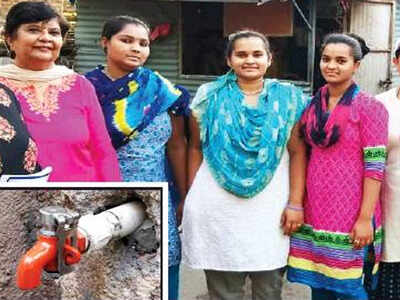
Sometime last month, citizen activists Pallavi Marathe and Bharati Bhondwe were passing through the Chafekarnagar slum in Model Colony, Shivajinagar, when they noticed a leaking outdoor tap.
A visit to the area shortly after revealed that the slum, which has around 3,000 residents, had many such leaky taps that were causing a severe wastage of water. Shocked, the activist duo immediately set out to carry out a survey of the slum. Within a few weeks, they had an idea - one that had the potential to save at least 11 lakh litres of water.
One part of the Chafekarnagar slum receives water between 8am and 10.30am; the other from 3pm until 8pm.
"We visited the slums and started keeping bottles under the taps. These bottles had a capacity to hold 500ml, 750ml or a litre of water. We then waited to see how long it took for the bottles to fill. The leakage from the outdoor taps was so severe that we found that some of the bottles were filling up within 15 minutes. Tallying it all up, we realised that around 11.5 lakh litres of water was going to waste every year in this slum alone," Marathe, a resident of Model Colony, said
She and Bhondwe were left with no choice, but to act immediately.
The activists procured about 35 new taps through Jalrakshak Prabodhini, an NGO. Assistance during the installation process was provided by Rotary Club, Uptown. The taps were installed across the slum by the first week of May.
"Some of the existing taps in the slum were so old that they broke apart as soon as the plumber touched them," said Bondhwe.
The new taps are as smart as they are solid. They have a handle that can be locked so that residents can have full control over supply. The locks will also curb unauthorised use that can often lead to wastage.
Rekha Sathe (40), a resident of the Chafekarnagar slum , was given a new tap.
"The old one had been leaking for almost a year and a half. It was also of very bad quality. A lot of our water was being wasted. However, the new one is extremely good. We can even use a lock and key to prevent unnecessary use of water," Sathe said.
Another resident, Hamrunnissa (45), said the new taps were a welcome change.
"The tap outside my home had been leaking for the past two months. We don't like seeing so much water being wasted - nobody does. So the new taps were a welcome shift. In some other areas, pots were being kept under leaking taps to prevent water going to waste," she said.
Leaking taps or faucets can have a major impact on a city's water supply. It is estimated that an average domestic tap can leak as much as 20,000 litres of water in a year. A leaking toilet, meanwhile, can waste more than 16,000 litres of water in a year.
Overall, experts estimate that an average house today leaks as much as 37,000 litres every year - the amount of water that will be needed to run 270 loads of laundry in a washing machine.
Marathe and Bondwe now plan on expanding their search for leaky taps. "There are many areas in the city where leaky taps cause a lot of water waste. There are also around five hostels where we plan to install these new taps," Marathe said.
A visit to the area shortly after revealed that the slum, which has around 3,000 residents, had many such leaky taps that were causing a severe wastage of water. Shocked, the activist duo immediately set out to carry out a survey of the slum. Within a few weeks, they had an idea - one that had the potential to save at least 11 lakh litres of water.
One part of the Chafekarnagar slum receives water between 8am and 10.30am; the other from 3pm until 8pm.
"We visited the slums and started keeping bottles under the taps. These bottles had a capacity to hold 500ml, 750ml or a litre of water. We then waited to see how long it took for the bottles to fill. The leakage from the outdoor taps was so severe that we found that some of the bottles were filling up within 15 minutes. Tallying it all up, we realised that around 11.5 lakh litres of water was going to waste every year in this slum alone," Marathe, a resident of Model Colony, said
She and Bhondwe were left with no choice, but to act immediately.
The activists procured about 35 new taps through Jalrakshak Prabodhini, an NGO. Assistance during the installation process was provided by Rotary Club, Uptown. The taps were installed across the slum by the first week of May.
"Some of the existing taps in the slum were so old that they broke apart as soon as the plumber touched them," said Bondhwe.
The new taps are as smart as they are solid. They have a handle that can be locked so that residents can have full control over supply. The locks will also curb unauthorised use that can often lead to wastage.
Rekha Sathe (40), a resident of the Chafekarnagar slum , was given a new tap.
"The old one had been leaking for almost a year and a half. It was also of very bad quality. A lot of our water was being wasted. However, the new one is extremely good. We can even use a lock and key to prevent unnecessary use of water," Sathe said.
Another resident, Hamrunnissa (45), said the new taps were a welcome change.
"The tap outside my home had been leaking for the past two months. We don't like seeing so much water being wasted - nobody does. So the new taps were a welcome shift. In some other areas, pots were being kept under leaking taps to prevent water going to waste," she said.
Leaking taps or faucets can have a major impact on a city's water supply. It is estimated that an average domestic tap can leak as much as 20,000 litres of water in a year. A leaking toilet, meanwhile, can waste more than 16,000 litres of water in a year.
Overall, experts estimate that an average house today leaks as much as 37,000 litres every year - the amount of water that will be needed to run 270 loads of laundry in a washing machine.
Marathe and Bondwe now plan on expanding their search for leaky taps. "There are many areas in the city where leaky taps cause a lot of water waste. There are also around five hostels where we plan to install these new taps," Marathe said.
#ElectionsWithTimes
more from times of india cities
Quick Links
Lok Sabha Election Schedule 2019Lok Sabha Election NewsDelhi Capitals teamMI team 2019Rajasthan Royals 2019RCB team 2019Maharashtra Lok Sabha ConstituenciesBJP Candidate ListBJP List 2019 TamilnaduShiv Sena List 2019AP BJP List 2019Mamata BanerjeeBJP List 2019 MaharashtraPriyanka GandhiBJP List 2019 KarnatakaAMMK Candidate List 2019BJP List 2019 WBLok Sabha Elections in Tamil NaduBSP List 2019 UPNews in TamilLok Sabha Poll 2019Satta Matka 2018PM ModiMahagathbandhanNagpur BJP Candidate ListChandrababu NaiduTamil Nadu ElectionsUrmila MatondkarNews in TeluguMadras High CourtTejashwi YadavArvind KejriwalTejasvi SuryaPawan KalyanArvind KejriwalYogi AdityanathJaya PradaSatta King 2019Srinagar encounter
Get the app











